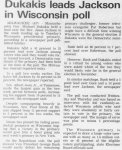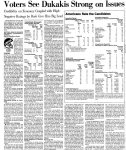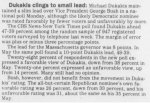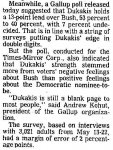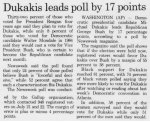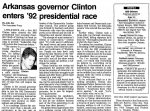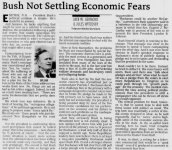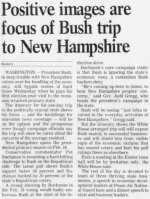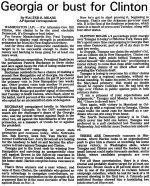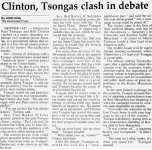Super Tuesday was a Democratic creation borne of good intentions that produced a disaster. A double disaster for the Democrats, in fact. It ended the Republican contest and let them have more time to get ready for the fall, and it splintered the vote so badly that the Democrats were left with:
a) the Northern liberal the contest was designed to limit
b) the black candidate who won 5 Southern states because the white vote split
c) a Southern candidate who did well in the region, winning 6 states, but nowhere else
On top of the fact the regional primary eliminated the one candidate, Dick Gephardt, who probably matched the intents of the creators of Super Tuesday more than anyone else competing. He carried only his home state of Missouri and now had to decide whether to continue or concede. Since he was popular with unions, he decided to make on last gasp effort in Michigan.
What the news media interpretation of events never bothered to mention was crucial: Michael Dukakis DID win 9 states, but he also finished third in no fewer than eleven states. Dukakis won two contest in the South, Florida and Texas, and then won a bunch of states OUTSIDE of the South, including his home state of Massachusetts. But in all of the interpretations of "the winner," it never seemed to occur to any of the analysts that Dukakis might be a disaster come November. In fact, there was a different disaster scaring the Hell out of the party: what if Al Gore and Dukakis split the white votes in the upcoming primaries and the party got stuck with Jesse Jackson as the nominee?
Of course, the Democrats had created something to prevent that from happening, the concept of super delegates. Although they dated back to the 60s, it wasn't until 1984 that the party wrote into their rules the idea that super delegates would have a vote that could potentially "overrule" the choices of the voters at the ballot box. This little insurance policy came out of the Hunt Commission and while it was primarily designed to prevent the nomination of a radical (most notably George Wallace, who was still in office in 1983), the whisper among the media with sources was that it was designed to prevent getting someone "too conservative" for the party, the most obvious suspect being Jimmy Carter winning the divided party in 1976. The next big competition - with South Carolina conceded to Jackson - was Illinois, and it was now the party had a problem.
Jackson was well-known for his involvement in Chicago politics, and Senator Paul Simon was on the ballot and campaigning by suggesting a "brokered Convention" that might possibly nominate someone besides Dukakis. The problem for Dukakis was simple: he had one week to tell the Illinois voters who he was while running against two candidates the state knew very well.
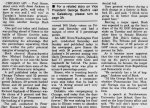
ABC/WAPO ILLINOIS POLL (MOE: 6)
Simon 39
Jackson 34
Dukakis 17
CHICAGO TRIBUNE POLL (MOE: 5)
Jackson 32
Simon 29
Dukakis 20
ACTUAL RESULTS
Simon 42
Jackson 32
Dukakis 17
Gore 5
Simon's win meant that five different Democratic candidates had now won competitive primaries.
Dukakis now had 11 days to turn out the vote in Michigan. But Gephardt was there, so it was far from certain he could pull this one off.
a) the Northern liberal the contest was designed to limit
b) the black candidate who won 5 Southern states because the white vote split
c) a Southern candidate who did well in the region, winning 6 states, but nowhere else
On top of the fact the regional primary eliminated the one candidate, Dick Gephardt, who probably matched the intents of the creators of Super Tuesday more than anyone else competing. He carried only his home state of Missouri and now had to decide whether to continue or concede. Since he was popular with unions, he decided to make on last gasp effort in Michigan.
What the news media interpretation of events never bothered to mention was crucial: Michael Dukakis DID win 9 states, but he also finished third in no fewer than eleven states. Dukakis won two contest in the South, Florida and Texas, and then won a bunch of states OUTSIDE of the South, including his home state of Massachusetts. But in all of the interpretations of "the winner," it never seemed to occur to any of the analysts that Dukakis might be a disaster come November. In fact, there was a different disaster scaring the Hell out of the party: what if Al Gore and Dukakis split the white votes in the upcoming primaries and the party got stuck with Jesse Jackson as the nominee?
Of course, the Democrats had created something to prevent that from happening, the concept of super delegates. Although they dated back to the 60s, it wasn't until 1984 that the party wrote into their rules the idea that super delegates would have a vote that could potentially "overrule" the choices of the voters at the ballot box. This little insurance policy came out of the Hunt Commission and while it was primarily designed to prevent the nomination of a radical (most notably George Wallace, who was still in office in 1983), the whisper among the media with sources was that it was designed to prevent getting someone "too conservative" for the party, the most obvious suspect being Jimmy Carter winning the divided party in 1976. The next big competition - with South Carolina conceded to Jackson - was Illinois, and it was now the party had a problem.
Jackson was well-known for his involvement in Chicago politics, and Senator Paul Simon was on the ballot and campaigning by suggesting a "brokered Convention" that might possibly nominate someone besides Dukakis. The problem for Dukakis was simple: he had one week to tell the Illinois voters who he was while running against two candidates the state knew very well.

ABC/WAPO ILLINOIS POLL (MOE: 6)
Simon 39
Jackson 34
Dukakis 17
CHICAGO TRIBUNE POLL (MOE: 5)
Jackson 32
Simon 29
Dukakis 20
ACTUAL RESULTS
Simon 42
Jackson 32
Dukakis 17
Gore 5
Simon's win meant that five different Democratic candidates had now won competitive primaries.
Dukakis now had 11 days to turn out the vote in Michigan. But Gephardt was there, so it was far from certain he could pull this one off.


